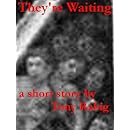
Strange Story #15: Mal De Mer
Author: Robert Dunbar
Collected In: Martyrs & Monsters
She who had gone to such lengths to deny her own
capacity for emotion believed the beast to be experiencing one...
The story Mal De Mer was for me the stand-out from Robert Dunbar's great collection Martyrs & Monsters. It's a tale that certainly features some monsters, but exactly how many and who they are, is another question. As is that of whether it features any martyrs, too.
It is told from the point of view of a nameless young (?) woman who is looking after an older, sick woman in a house by the sea. Neither of them seem to have any friends or connections with any neighbours. At the start of the tale the narrator doesn't like the sea, and this fact is used both to show her distance from normal people and her somewhat morbid frame of mind:
Did other people truly find this noise agreeable? Waves slid with an oily crunch; each grating hiss marked the extinguishment of time she could never regain.
The narrator is also differentiated from 'normal' people by her lack of emotion; on encountering some odd children playing alone on the beach she can only think about the situation intellectually, not emotionally: children often did foolish things, did they not? She believed this to be the case. And despite her job as a carer she appears to feel no real empathy for her charge, and to be just waiting for the old lady to die (the lady is stubbornly refusing to do so).
As I said, there are multiple monsters in this story: the odd children for starters, and maybe a man who, before the day the story is set, appears to have provided the one source of genuine, physical feeling for the narrator. He is someone she met and had sex with on the beach. Yes despite this he is described almost like a scarred walrus thrown up on the beach. Her encounters with him are pleasurable but lustful only, and described in terms like drowning...
...and the source of his scars is never fully explained.
And yet more monsters: the odd children, the scarred lover, and something vast and hideous that comes from the depths of the sea. (It shows Dunbar's skill, incidentally, that he manages to make the story unified and of a piece despite all these differing elements to it.) And towards all of them, in a way, the narrator feels more emotional connection than with the dying old lady she is looking after... (This emotional, wordless connection between the central character and the so-called monsters is a recurrent theme in the stories in this collection.)
But maybe, the story seems to suggest, she still doesn't feel enough.
Next Time: Strange Stories #16. The Little Dirty Girl by Joanna Russ.



